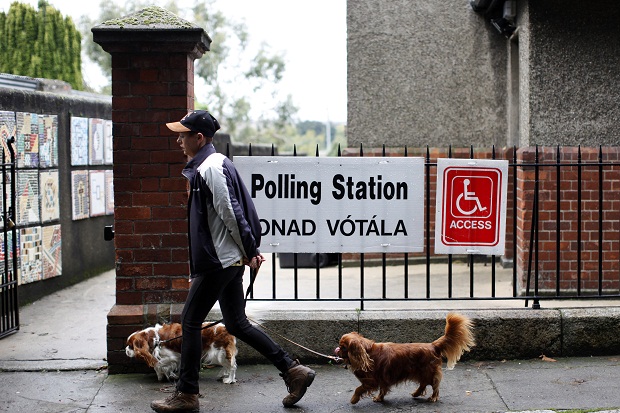Waves of apathy, a tsunami of indifference, engulfed Ireland for today’s constitutional referendums. When I was over there last week, I was more interested in the thing than anyone I met; the turnout in some places was one in ten – miles lower than in high-octane votes, like the ones affecting the EU. The main issue is the government’s proposal to do away with the upper house, the Seanad, or Senate, which reached its zenith of interest and relevance when WB Yeats was a member (his views on contraception and divorce make notable reading) and has failed ever since to capture the remotest public affection. If you think the House of Lords doesn’t really register with voters, well, it begins where the Irish Senate leaves off.
During Irish elections, the lamp-posts give you the gist of what’s going on; they get plastered with posters from the assorted parties. Two summed up the arguments. The pro-government one gave a checklist of reasons for abolition: Save Euro 20 million! Fewer politicians! The one from the opposition Fianna Fail party showed a boot coming down on the senate (I never said these things are subtle): ‘Vote against the power grab!’ Now every electorate in Europe would perk up at the idea of fewer politicians…and it says everything about the political class’s awareness of the contempt in which it is held that this should be one of its chief arguments.
Nonetheless, I am instinctively in sympathy with the power grab poster. Every legislature needs a revising chamber; every executive needs checking. It doesn’t help that the Irish upper chamber has a uniquely non-populist method of selection; its electorate for some of the seats is limited to university graduates, a system designed in the days before every halfwit school-leaver goes on to third level education. And the rest are filled on the basis of party political patronage, with the same happy results you get in the House of Lords. This has some odd results: one apolitical friend of mine is, as a university graduate, a Senate voter; her husband, the most disinterestedly politically engaged individual I know, isn’t.
But what I loathe about the Senate and the Lords is not that they are undemocratic, but that they are a means for governments positively to circumvent democracy. People get seats in upper chambers who would never get a popular mandate if the electorate had the smallest say in the matter. They are not just a refuge for individuals too high minded to engage in politics, or occupied with better things, but for those who have failed in popular elections or who would have failed if people had been given the smallest chance to vote for anyone else.
Let me give a couple of examples. Mary Robinson came to public prominence, not as a popular politician, but as a member of the senate, representing Trinity College (now that was elitist); her progressive views were both unrepresentative and unpopular for much of her time there but it was a fabulously useful public platform. (Later of course she became Irish president, on the basis of second preference votes.)
Over here, Baroness Warsi was parachuted into the Lords, and on that basis, into the Cabinet, after she failed to get elected in Dewsbury in 2005. She has since occupied a series of prominent positions in public life on the back of it … but no one ever elected her. It’s this role of second chambers as the refuge of the unelectable and a springboard for their pursuit of the highest offices, which make them objectionable. If they simply got on with the job of revising legislation, quietly and competently, I’m not sure anyone would mind their continued existence.







Comments